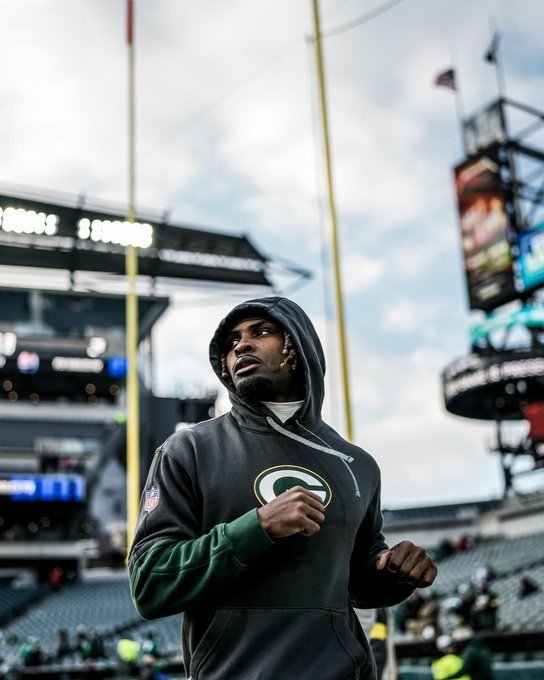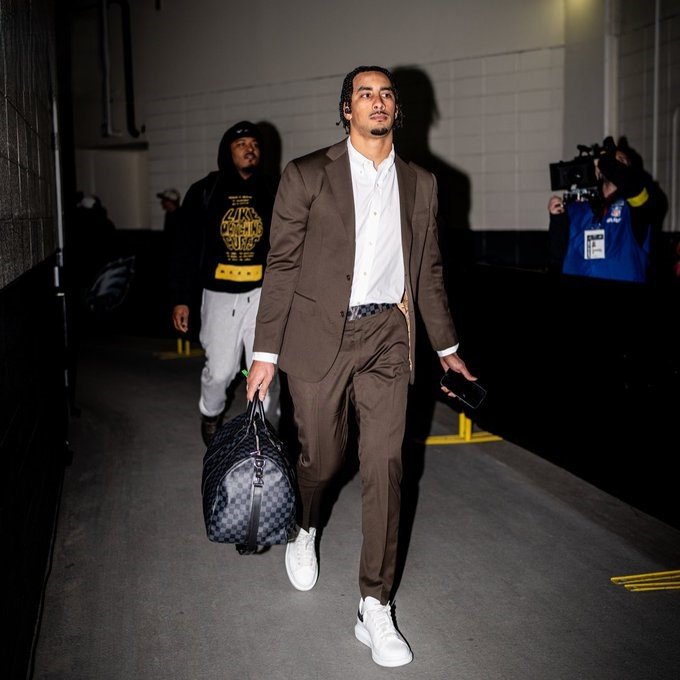Wild-Card Loss Exposes Packers’ Challenges: A Painful End To 2024
- Leave a Comment
- William D
- January 13, 2025

The Green Bay Packers’ 2024 season ended in disappointment as they lost to the Philadelphia Eagles 22–10 in the wild-card round. The Packers struggled during the season due to a mix of injuries, turnovers, and reoccurring issues, despite an 11-win season that showed signs of potential.
The defeat at Lincoln Financial Field served as a sobering reminder of the work required to get back into the running for the championship as well as a reflection of their problems versus elite NFC clubs.
A series of injuries plagued the game, leaving the Packers with a thin roster. In the second half, Christian Watson, who was already out due to an ACL tear, was joined by starting wide outs Romeo Doubs and Jayden Reed. Josh Myers and left guard Elgton Jenkins both departed the game early after taking serious hits to the offensive line.
The team’s defensive problems were made worse by lineman Devonte Wyatt’s injury in the first quarter. Due to these injuries, the Packers were forced to use backups, who found it difficult to cover for the powerful Eagles.
The Packers were hindered not only by injury but also by the same problems that characterized their season: poor starts and mistakes. A turnover on the first kickoff set the tone for a game full of errors, as quarterback Jordan Love tied a career best with three interceptions.
In addition to failing to create any offensive rhythm, the squad tied a season-high five holding penalties. These problems demonstrated the Packers’ incapacity to perform under duress, especially when facing top-tier opponents.
Thanks to a great start and Jordan Love’s contract deal, Green Bay had high expectations going into the 2024 season. The team’s 0–6 record against NFC powerhouses like the Vikings, Eagles, and Lions, however, shown that they were unable to step up to the challenge.
The Packers’ offensive depth, consistency, and ability to win big games will be the main topics of discussion as they prepare for the summer.

On an already difficult night, injuries are mounting
The Green Bay Packers’ problems were exacerbated by injuries, which were a major factor in their wild-card loss to the Philadelphia Eagles. Christian Watson, the Packers’ wide receiver, had already missed the game due to a season-ending ACL tear the week before.
Against a strong Eagles defense, quarterback Jordan Love’s options were reduced by the loss of Watson, a crucial contributor in the passing game. The Packers’ injury problems worsened as the game went on, leaving the offense disorganized and unable to mount a comeback.
One of the Packers’ most dependable targets, Romeo Doubs, left the game in the third quarter after suffering his second concussion of the season following a hard fall in the end zone. The Packers’ receiving corps was further weakened as teammate wide receiver Jayden Reed left shortly after due to a dislocated shoulder.
Love was missing his top three wideouts because Watson was unavailable and both players were out. The Packers’ passing game was disrupted and drives were stalled in crucial situations as a result of having to rely on backups and inexperienced players due to a lack of experienced targets.
Injuries to important players also made it difficult for the Packers to protect Love and implement a running game, so the offensive line was not exempt. The Packers had to rearrange their line after left guard Elgton Jenkins exited in the first quarter due to a shoulder injury.
In relief, backup Kadeem Telfort and rookie Travis Glover also had trouble, committing several holding penalties that halted the attacking momentum. The Packers’ offensive line was in ruins at the end of the game after center Josh Myers left in the fourth quarter due to a lower leg injury, adding to the litany of casualties.
The loss of lineman Devonte Wyatt in the first quarter proved to be costly for the defense. Saquon Barkley of the Eagles rushed for 119 yards on 25 carries while Wyatt, one of the Packers’ best run stoppers, was sidelined due to a lower leg injury.
Despite their best efforts, the Packers’ defense lacked the depth and playmaking skills necessary to stop the Eagles’ well-rounded attack. In addition to impairing the team’s performance, the cumulative effect of these injuries brought attention to the narrow margin for error in the playoffs, where each player’s contribution counts.
“He is very critical of himself and he does such a great job of learning from every experience. Going through this, I think we’ll all be better for it.”
— Green Bay Packers (@packers) January 13, 2025
Recurrent Conflicts: A Seasonal Theme
The Green Bay Packers’ recurrent problems throughout the 2024 season were exemplified by their wild-card loss to the Philadelphia Eagles. Keisean Nixon’s blunder on the first kickoff put the Packers on the defensive right away, and turnovers once again proved to be the team’s weak point.
Jordan Love, the quarterback, tied a career high with three interceptions, adding to the team’s problems. In addition to derailing the Packers’ offensive attempts, these costly errors gave the Eagles crucial chances to take advantage of short fields and increase their lead.
The Packers’ problems were made worse by penalties; they were called for five holding fouls, which tied their season high. Already compromised by injury, the offensive line found it difficult to remain disciplined under duress.
An already faltering attack was further stifled by crucial penalties committed by substitutes like backup Kadeem Telfort and youngster Travis Glover, who repeatedly stopped drives and erased gains.
These unintentional mistakes demonstrated the team’s incapacity to perform well, particularly when facing top-tier opponents, and revealed a lack of concentration during crucial situations.
Jordan Love’s subpar performance made the Packers’ offensive problems even worse. Love struggled to find any rhythm without his top three receivers, Christian Watson, Romeo Doubs, and Jayden Reed. As a result, he finished the game without a touchdown and with three costly interceptions.
The Packers were only able to score 10 points against a formidable Eagles defense because of the receiving corps’ inability to create plays and maintain drives. The team’s season-long tendency to struggle to produce offense in crucial games was reflected in this inconsistency.
The Packers’ incapacity to compete against elite NFC teams was arguably the most obvious problem of the 2024 season. The Packers consistently lost to the best teams in the conference, going 0–6 versus the Eagles, Lions, and Vikings.
Recurring themes included slow starts and a failure to finish games because the club was unable to rise to the occasion due to turnovers, penalties, and offensive inefficiency. The wild-card loss was a sobering reminder of these deficiencies, highlighting the effort required to bridge the gap between the Packers and the top teams in the NFC.
LIVE: QB Jordan Love meets with the media following #GBvsPHI 🎙️ https://t.co/rwRtBvBSiH
— Green Bay Packers (@packers) January 13, 2025
There were concerns regarding Jordan Love’s development and the future of the Green Bay Packers after his second season as the team’s starting quarterback was characterized by both promise and inconsistency. Expectations were quite high after Love signed a four-year, $220 million agreement in the offseason.
He showed his ability to guide the Packers in the post-Aaron Rodgers era throughout the regular season by displaying bursts of genius. But his postseason performance—a three-interception, zero-touchdown game in the Eagles’ wild-card loss—emphasized the areas that require work.
Love gave hints of why the Packers had chosen him to be their franchise quarterback throughout the regular season. He shown great arm skill, quickness, and the capacity to make big plays when it mattered most. But his inconsistency—especially when it came to elite competition—became a recurrent theme.
This problem was brought to light during the wild-card game, when Love found it difficult to establish his rhythm without his top three receivers. His incapacity to defend the football and his poor decision-making under duress sparked questions about his ability to continuously improve when it counts most.
When Love looked back on his season, he recognized his accomplishments as well as the areas that needed improvement. After the game, Love remarked, “I think there are definitely areas that I improved on, that the team improved on.” “And I definitely want to get better at some things, like cleaning up.”
His readiness to accept responsibility is encouraging, but the Packers will need him to apply those lessons to make real progress, especially under duress. As Love begins his third season as a starter, the offseason will be crucial for him to strengthen his areas of weakness and improve his abilities.
Jordan Love’s growth continues to be the main focus of the Packers’ future. Although his moments of promise inspire optimism, his failures in crucial games raise questions. The team’s capacity to compete with the NFC’s best will ultimately depend on Love’s ability to advance.
Unlocking Love’s potential and securing the team’s success in the upcoming years will depend on strengthening the supporting cast and addressing his growth areas as the Packers enter the offseason.

There were several positive aspects of the Green Bay Packers’ wild-card loss to the Philadelphia Eagles that gave fans hope for the team’s future despite the disappointment. Running back Josh Jacobs was one of the team’s most noteworthy bright spots; in spite of the team’s general difficulties, he put on a solid effort.
With 121 yards from scrimmage and the Packers’ only touchdown, Jacobs proved to be a valuable member of the offense. His capacity to perform well under duress demonstrates why he will continue to be an important component of Green Bay’s future plans.
In addition to being a reliable player on the field, Jacobs has become a leader in the locker room. He spoke strongly about the team’s desire to advance after the game, stressing the value of planning and execution.
“Nobody in this league is going to be able to f— with us if we figure out how to take that step,” Jacobs remarked. His self-assurance and leadership will be crucial as the Packers try to strengthen their areas of weakness and create a more competitive squad during the summer.
There were some positive aspects to the defense as well, as they performed admirably in spite of difficult conditions. The Packers’ defense was able to keep Jalen Hurts’ passing game to modest numbers via the air, even though they lost important tackle Devonte Wyatt early in the game.
The secondary showed tenacity and discipline in coverage, holding its own against the Eagles’ powerful receiving corps. Even though the offense struggled for a large portion of the game, this defensive effort kept the Packers within striking distance.
Wyatt’s absence, meanwhile, was noticed in the run defense as the Packers found it difficult to hold Saquon Barkley. Using Green Bay’s weakened defensive front, the Eagles’ star rushing back amassed 119 yards on 25 carries.
Although this highlights a problem, the defense’s overall performance demonstrated promise, especially in terms of its capacity to adjust and contend with the Eagles’ explosive offense. These areas of strength are the foundation of a team that has the talent to compete if it can overcome its main weaknesses.
In order to compete for a championship in 2025, the Green Bay Packers need to concentrate on resolving a number of important challenges. The season has been plagued by turnovers and penalties, which led to the Eagles’ wild-card loss. The Packers showed a lack of discipline during pivotal moments, committing four turnovers and five holding penalties.
The squad needs to focus on ball security and cut down on expensive penalties if they want to have a real chance at the playoffs the next season. To avoid making the same errors that have often ruined their offensive, especially when playing against top teams under pressure, they must get better in these areas.
Overcoming sluggish beginnings will be another crucial area of attention, particularly when up against elite competitors. The Packers have trouble getting off to a solid start, especially when playing NFC heavyweights like the Vikings, Eagles, and Lions.
They were frequently forced into catch-up mode as a result of these early deficits, which made their offensive and defensive problems worse. The Packers need to be competitive in the early phases of games and cultivate a sense of urgency from the first whistle if they want to compete in 2025. Maintaining a competitive edge against the NFL’s top players will require this executional development.
The Packers’ performance in the upcoming season will be greatly influenced by roster management and health. The 2024 injuries that plagued the team brought home how crucial depth and player availability are. The Packers will have a far greater chance of competing at a high level if their squad is totally healthy.
In the offseason, the front office must concentrate on strengthening the roster, especially by addressing free agency and adding depth at critical spots. The Packers will be more capable of managing the rigors of a full season and a postseason run if they can maintain their health in 2025.
To move the team ahead, planning and leadership will also be essential. Throughout the season, especially during crucial times, head coach Matt LaFleur must be accountable for enhancing team discipline and making necessary adjustments. His flexibility will be put to the test as the Packers look to transform from a talented club into one that can contend for titles.
Additionally important will be player leadership, such as that displayed by Josh Jacobs. Jacobs’ exhortation to “take the next step” acts as a rallying cry for the Packers, encouraging them to improve their performance and confront their shortcomings. The Packers could compete with the top teams in the NFC in 2025 if they can improve their performance and use their leadership.
Conclusion:
The Green Bay Packers’ wild-card loss to the Philadelphia Eagles in 2024 revealed many of the team’s shortcomings, leading to a disappointing season finale. Their efforts were hindered by injuries, penalties, and turnovers, leaving both players and supporters disappointed by what might have been.
Even though the Packers finished the season with 11 wins, they eventually failed to reach their full potential when it counted most, especially in the intense playoff atmosphere.
Nevertheless, despite the difficulties, there are indisputable indications of hope. With fresh talent like Josh Jacobs and Jordan Love emerging as important future players, the Packers have a strong foundation.
Though erratic, Love’s growth gives hope for improvement in the years to come, and Jacobs’ performance and leadership in trying circumstances demonstrate the team’s heart and resolve. Furthermore, the defense shown tenacity despite hardship, and the foundation for further development is in place.
The Packers are equipped to compete for a postseason berth and perhaps even more in 2025. Green Bay can set itself up for a more robust and reliable season by concentrating on enhancing discipline, cutting down on turnovers, and addressing critical depth areas throughout the summer.
The club will be ready to take on the best teams in the NFC if they can maintain their health and perform well under duress. Even though 2024 was a season filled with lost chances, it was also a teaching moment, and if the Packers can learn from this year, their future is still bright.
The Green Bay Packers have all they need to recover and contend for a postseason berth in 2025 with the correct tweaks and sustained development. Although the road ahead may be difficult, there is still hope for a better, more prosperous future because the foundation is solid.
